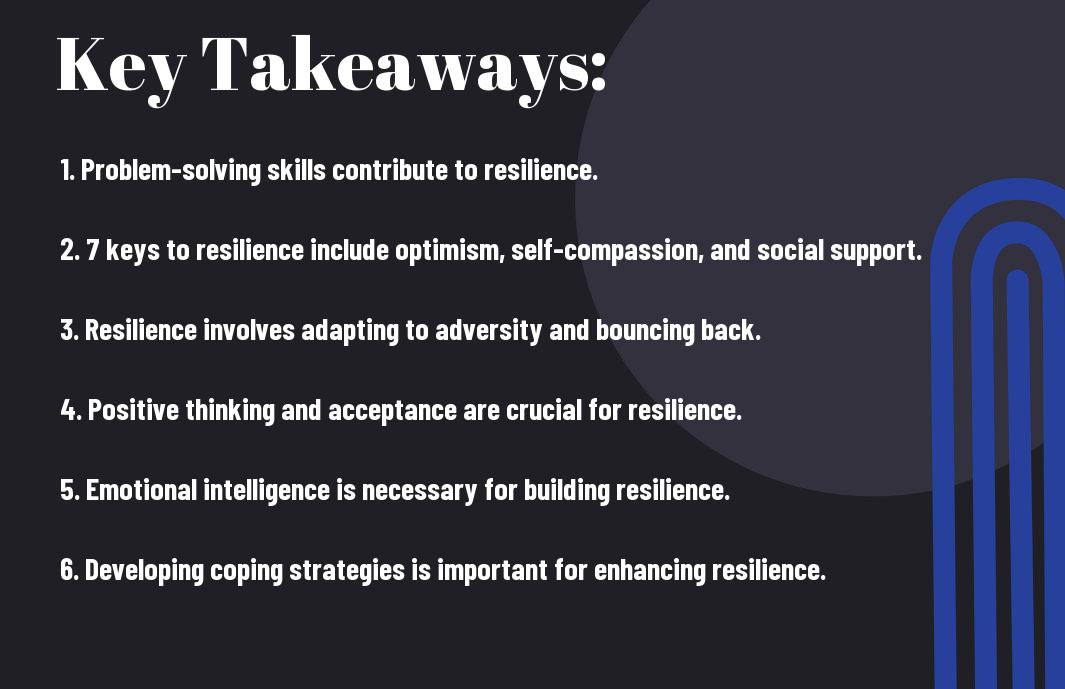Can Problem-solving Skills Enhance Your Resilience? What Are The 7 Keys To Resilience?
It’s no secret that resilience is a crucial trait in navigating life’s challenges. In today’s fast-paced world, being able to adapt and bounce back from adversity is more important than ever. One key aspect of resilience that often gets overlooked is the role of problem-solving skills. In this blog post, we will explore how honing your problem-solving abilities can enhance your resilience. Additionally, we will explore into the 7 important keys to developing and strengthening your resilience, providing you with actionable strategies to thrive in the face of any obstacle.

Key Takeaways:
- Problem-solving skills can enhance resilience: Being able to effectively address challenges and find solutions can boost your ability to bounce back from setbacks.
- Resilience is crucial in overcoming adversity: Developing resilience can help you navigate through tough times with more ease and strength.
- The 7 keys to resilience are self-awareness, self-regulation, optimism, mental agility, strength of character, connection, and reaching out.
- Self-awareness is foundational: Understanding your own emotions and reactions is crucial in building resilience.
- Connection with others is key: Building a support network and reaching out for help when needed are important components of resilience.

Understanding Resilience
Definition and Key Aspects of Resilience
Resilience is the ability to adapt and bounce back when faced with adversity, trauma, or stress. It involves coping with challenges and setbacks while maintaining a sense of purpose and optimism. Key aspects of resilience include perseverance, flexibility, self-awareness, and the ability to manage strong emotions.
The Benefits of Being Resilient
One of the significant benefits of being resilient is the capacity to navigate through difficult circumstances without being overwhelmed. Resilient individuals often have a positive outlook on life, which helps them approach challenges as opportunities for growth and learning. They also tend to have stronger relationships, as their ability to handle stress positively impacts their interactions with others.
Aspects such as problem-solving skills, emotional regulation, and a strong support system play crucial roles in enhancing resilience. By developing these aspects, individuals can better cope with adversity and maintain a sense of well-being amidst life’s inevitable ups and downs.
The Role of Problem-Solving in Building Resilience
Navigating Challenges Effectively
Building resilience involves developing problem-solving skills to effectively navigate challenges that come your way. When faced with adversity, individuals with strong problem-solving abilities can approach the situation strategically, break it down into manageable components, and work towards finding solutions. This proactive approach not only helps in overcoming the current obstacle but also builds resilience for future challenges.
Adaptive Learning from Problem-Solving Experiences
Resilience is not just about bouncing back from setbacks but also about learning and growing from them. Through problem-solving experiences, individuals can adapt and evolve their strategies based on what worked and what didn’t. This adaptive learning process enhances resilience by equipping individuals with a repertoire of effective problem-solving approaches that can be applied in various situations.
Experiences shape our problem-solving abilities and resilience. Every challenge, whether big or small, offers an opportunity to strengthen our problem-solving skills and resilience. By reflecting on our experiences, identifying what strategies were successful, and incorporating that knowledge into future problem-solving endeavours, we can continue to enhance our ability to bounce back and thrive in the face of adversity.
The 7 Keys to Resilience
Self-Awareness and Mindfulness
After facing adversity, self-awareness and mindfulness play a crucial role in building resilience. Any individual who is in tune with their thoughts and emotions can better navigate challenges and setbacks. By practising mindfulness, one can develop a deeper understanding of themselves and their reactions to stressors, ultimately enhancing their ability to bounce back from difficult situations.
Positive Relationships and Support Networks
To cultivate resilience, having positive relationships and a strong support network is imperative. Surrounding yourself with individuals who uplift and encourage you can provide the emotional backing needed to weather storms. Whether it’s friends, family, or mentors, these connections can offer different perspectives and guidance during tough times.
Resilience is the ability to withstand and bounce back from adversity. It involves adapting to challenges, maintaining a positive outlook, and effectively coping with stressors. By mastering the following seven keys to resilience, individuals can cultivate the strength needed to thrive in the face of adversity.
Purposeful Goal Setting
Keys to resilience also involve purposeful goal setting. By setting specific, achievable goals, individuals can create a sense of direction and motivation to overcome obstacles. Goals provide a roadmap for progress and can help individuals stay focused and driven, even in the face of setbacks.
Developing Adaptability
Understanding the importance of developing adaptability is crucial for resilience. Goal setting involves creating a plan for success and being flexible in adapting to changing circumstances. By embracing change and being open to new strategies, individuals can better navigate challenges and overcome obstacles.
Fostering a Positive View of Self
Developing a positive view of oneself is key to building resilience. Self-awareness and self-acceptance are vital components of resilience, as they help individuals cultivate a strong sense of self-worth and confidence. By acknowledging strengths and working on weaknesses, individuals can enhance their resilience and bounce back from adversity.
Maintaining Perspective
A key aspect of resilience involves maintaining perspective during difficult times. By keeping a balanced view of situations and focusing on the bigger picture, individuals can avoid being overwhelmed by challenges. Perspective allows individuals to see setbacks as temporary obstacles rather than insurmountable barriers, enabling them to persevere and overcome adversity.
Stress Management and Coping Strategies
To build resilience, having effective stress management and coping strategies is imperative. Positive stress management techniques such as exercise, mindfulness, and seeking social support can help individuals regulate their emotions and navigate challenging situations. By developing healthy coping mechanisms, individuals can better cope with stress and bounce back from adversity.
Enhancing Problem-Solving Skills to Boost Resilience
Strengthening Cognitive Abilities
Your problem-solving skills play a crucial role in building resilience. By honing your cognitive abilities, you can better navigate challenges and setbacks. Strengthening your cognitive abilities involves improving your critical thinking, decision-making, and analytical skills.
Practical Exercises for Improved Problem-Solving
Problem-solving abilities can be enhanced through practical exercises that challenge your cognitive processes. Engaging in puzzles, brain teasers, and strategy games can help sharpen your problem-solving skills. Additionally, setting aside time for creative problem-solving sessions can encourage out-of-the-box thinking and innovation.
To truly boost your resilience, it’s important to not only recognize the importance of problem-solving skills but also actively work on improving them. By regularly engaging in exercises that target your cognitive abilities, you can develop a more agile and resilient mindset that is better equipped to face life’s challenges with confidence.
Final Words
Considering all the points discussed, problem-solving skills can indeed enhance your resilience by helping you navigate through challenges effectively. The 7 keys to resilience include having a positive outlook, building strong relationships, staying healthy, practising mindfulness, accepting change, setting goals, and developing problem-solving skills. By honing these key areas, individuals can strengthen their ability to adapt, bounce back from setbacks, and thrive in the face of adversity. Cultivating resilience is a valuable asset that can lead to personal growth and greater well-being. Recall, that resilience is a skill that can be learned and developed over time, empowering you to face life’s trials with confidence and determination.
FAQ
Q: Can problem-solving skills enhance your resilience?
A: Yes, problem-solving skills play a crucial role in enhancing resilience. By effectively addressing and overcoming challenges, individuals can develop a strong ability to bounce back from adversity.
Q: What are the 7 keys to resilience?
A: The 7 keys to resilience are self-awareness, self-regulation, optimism, mental agility, strengths of character, connection, and reaching out.
Q: How does self-awareness contribute to resilience?
A: Self-awareness allows individuals to recognize their emotions, thoughts, and behaviours, enabling them to effectively manage stress, adapt to changes, and persevere during challenging times.
What role does optimism play in building resilience?
A: Optimism helps individuals maintain a positive outlook, handle setbacks with a growth mindset, and believe in their ability to overcome obstacles, which is crucial for resilience.
How can developing problem-solving skills improve resilience in individuals?
A: By honing problem-solving skills, individuals can approach challenges with a solution-oriented mindset, learn from each experience, and build confidence in their ability to navigate difficult situations, ultimately enhancing their resilience.